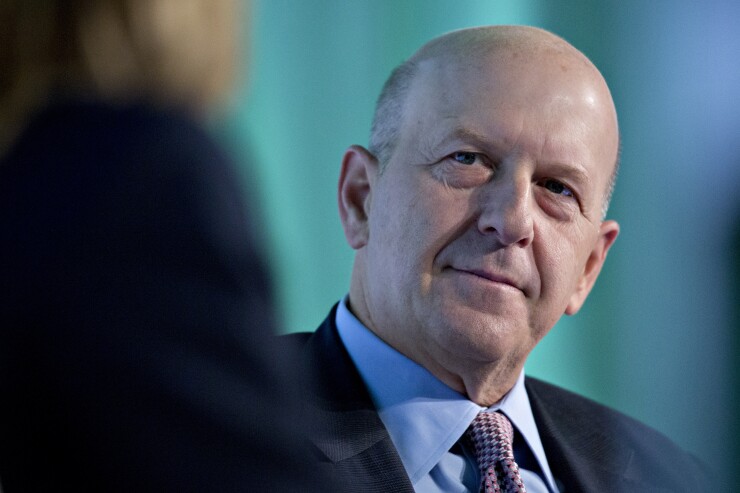Receiving Wide Coverage ...
Rates held
As expected, the Federal Reserve “left its benchmark interest rate unchanged Wednesday and reaffirmed its make-no-moves posture,” the Wall Street Journal reports. But Fed Chairman Jerome Powell’s comments at a news conference following the Fed’s monetary policy meeting “suggested that lingering risks to the global economy and difficulty sustaining inflation at the Fed’s 2% target meant that if Fed officials were to change rates, they would be
“Even though it left the Fed’s main policy rate unchanged, the committee did raise by five basis points
Powell “walked a careful line in his post-meeting news conference, painting a picture of a solid economy that is fueled by strong job gains and a confident consumer willing to spend,” the New York Times says. “But he noted that
“Central bank officials are
Not impressed
Goldman Sachs Wednesday “gave shareholders an unprecedented look under the hood at its first-ever investor day, aiming to turn skeptics into believers in Chief Executive David Solomon’s turnaround plan,” the Journal reports. “Goldman

It also “debuted a newfound openness once unthinkable for the aloof Wall Street firm. Mr. Solomon, a year into the CEO job, has tried to humanize Goldman and drop some of the secrecy that once bolstered its mythic status but has played poorly with investors as profits fell.”
But Goldman’s presentation
The firm “promised a sharp improvement in profitability in an attempt to quell shareholder concerns that the once-undisputed champion of Wall Street has lost its touch,” the paper added. “Goldman said it aimed to achieve a 14% return on tangible equity by 2022. The target, which includes $1.3 billion of cost savings during the next three years, would be a significant improvement on its latest return of 10.6%.
Yet the “long-awaited presentation
While Goldman “is making some eye-catching forays into new businesses, for the next couple years, at least, a big part of its fortunes will still be tied to what it long has been: a Wall Street trading house,” the Journal says. “So while it is tempting to focus on the future of Goldman’s Marcus consumer bank or its new transaction-banking platform, any share-price gains for now may be driven more by its longstanding global markets business. Main Street might be Goldman’s future, but
American Banker’s Kevin Wack looks into Goldman’s
Tough times
A day after it was revealed that pay raises for Deutsche Bank’s rank-and-file employees won’t take effect until April 1, rather than retroactive to the beginning of the year, the FT reports “most senior executives will take home bonuses for 2019, abandoning a recent practice of waiving them during unprofitable years. Although the nine members of Deutsche’s management board, which include chief executive Christian Sewing, have agreed to forego about half of their variable pay for last year, they can still expect to receive about €13 million bonuses.”
However, “one person familiar with the matter said the executives on the nine-member board
Separately, Deutsche reported a €5.3 billion ($5.8 billion) loss for full-year 2019, highlighting the size of its challenge in making itself leaner and more profitable through a sweeping overhaul,” the Journal reports. “Despite the steep loss, the bank reported
Another positive: The bank reported
One big reason for the loss: “The bank
Wall Street Journal
Mastering the quarter
Mastercard said its fourth quarter net income more than doubled to $2.1 billion compared to the year earlier quarter, when it took more than $750 million in litigation charges. Net revenue rose 16% to $4.41 billion. Card transaction volume climbed 11% to $1.73 trillion.
Looking ahead, “the company said it expects adjusted operating expenses in 2020 to climb by a high single-digit percentage and affirmed it is expecting adjusted revenue to rise by a percentage in the low teens. Mastercard’s revenue guidance is on par with the three-year guidance the company gave a year ago, calling for compound annual
No shaming
“Attendees at the World Economic Forum in Davos last week repeatedly heard that the path to a carbon-free future runs through the financial system.” But “that can be achieved only through difficult political decisions rather than public shaming” of banks, the paper says.
“One way the climate-conscious can accomplish this is by pushing banks to extend
Elsewhere
For shame
JPMorgan Chase and Morgan Stanley “have been placed on the Hong Kong Stock Exchange’s ‘named and shamed’ list after the $300 million initial public offering of Chinese biotech company Akeso Inc. was sent back for
Quotable
“We’re





